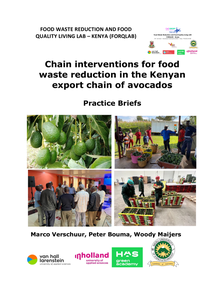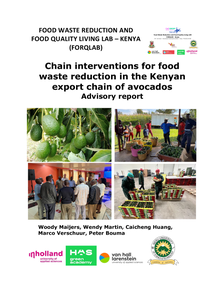The Kenyan supreme court recently struck down a government decision to ban the registration of an LGBTIQ+ community rights organisation, sparking new homophobic rhetoric in the country. Kenya is one of 32 African countries that criminalises homosexuality. Those who identify as part of the LGBTIQ+ community are often discriminated against, harassed and assaulted. Lise Woensdregt and Naomi van Stapele, who have researched queer experiences in Kenya for nine years, explain the impact of this ruling.
DOCUMENT

This magazine presents the highlights of the applied research project “Inclusive and climate-smart business models in Ethiopian and Kenyan dairy valuechains (CSDEK)”. The CSDEK applied research project was conducted in six case study areas, three in Ethiopia and three in Kenya. At the time of publishing this magazine, research was still ongoing in some of the study areas. The projectteam and researchers hope to contribute to creating awareness of climatesmartdairy practices and development of the dairy sector in Ethiopia and Kenya. In two of the study areas, collaboration between VHL and dairy stakeholders will continue, preferably through local networks in a Living Lab approach.
DOCUMENT

This booklet presents twenty-one impact stories of Ethiopian and Kenyan alumni of Dairy (Livestock) trainings in the Netherlands. The Dutch trainings consists of Master courses conducted by Van Hall Larenstein University of Applied Sciences (VHL) in Wageningen or Velp, short courses or diploma courses organised by Practical Trainings Centre (PTC+) in Oenkerk or Barneveld / Dairy Trainings Centre (DTC) in Oenkerk and short courses organised by Centre of Development Innovation – part of Wageningen University and Research Centre (WUR) in Wageningen. Most refresher course participants attended the Dutch trainings between 2010 and 2018. These alumni attended the Refresher Course entitled “Assessing the impact of Dutch knowledge institutions on performance of Netherlands alumni on dairy value chain governance in Kenya and Ethiopia” organised by Van Hall Larenstein University of Applied Sciences (VHL), Agrikom (alumni organisation) and Egerton University on 7-16 July 2019 in Nairobi and Nakuru, Kenya. Part of the refresher course was dedicated to a write shop about the impact of the Dutch training. It was written in collaboration with the professorship Climate Smart Dairy Value Chains.
DOCUMENT

This booklet presents the practice briefs (popular papers) of master and bachelor theses and business assignments of students at three Dutch Universities of Applied Sciences: Van Hall Larenstein (VHL), InHolland and HAS Green Academy, and Meru University of Science and Technology in Kenya. All theses and business assignments were commissioned through the researchproject entitled “Food Waste Reduction and Food Quality Living Lab (FORQLAB)” in Kenya.
DOCUMENT

This publication the avocado advisory report which is based on popular papers (practice briefs) of master and bachelor theses and business assignments of students at three Dutch Universities of Applied Sciences: Van Hall Larenstein (VHL), InHolland and HAS Green Academy, and Meru University of Science and Technology in Kenya. All 23 theses and business assignments were commissioned through the research project entitled “Food Waste Reduction and Food Quality LivingLab (FORQLAB)” in Kenya.
DOCUMENT

Analyse the results from a representative selection of the supply chain studies for school feeding programmes in Kenya, Ghana and Mali, and make specific suggestions for interventions that can efficiently include SHF in the supply chains.
DOCUMENT

Climate change adaptation requires understanding of complex social ecological systems (SESs). One source of uncertainty in complex SESs is ambiguity, defined as the range and variety of existing perceptions in and of an SES, which are considered equally valid, resulting in a lack of a unique or single system understanding. Current modelling practices that acknowledge the presence of ambiguity in SESs focus on finding consensus with stakeholders; however, advanced methods for explicitly representing and aggregating ambiguity in SESs are underdeveloped. Moreover, understanding the influences of ambiguity on SES representation is limited. This paper demonstrates the presence and range of ambiguities in endogenous and exogenous system drivers and internal relationships based on individual fuzzy cognitive maps derived from stakeholder perceptions of climate change adaptation in Kenya and introduces an ambiguity based modelling process. Our results indicate that acknowledging ambiguity fundamentally changes SES representation and more advanced methods are required.
DOCUMENT
With this project we strived to contribute to structural reduction of post-harvest food losses and food quality improvement in the Kenyan avocado and dairy value chains through the application of technical solutions and tools as well as improved coordination in those food chains. The consortium had four types of partners: 1. Universities (2 Kenyan, 4 Dutch), 2. Private sector actorsin those chains, 3. Organisations supporting those chains, and 4. Network partners. The applied research has been implemented in cooperation with all partners, whereby students at involved universities conducted most of the field studies and all other consortium partners support and interact depending on the phases.The FORQLAB project targeted two areas in Kenya for both commodities, a relatively well-developed chain in the central highlands and a less-develop chain in Western-Kenya. The research methods were the business to business and multi-stakeholder (living lab) approaches to increase the potential for uptake of successful interventions in the chain. The project consisted of four phases: 1. Inventory and inception, 2. Applied research, 3. Spreading research outputs through living lab networks, 4. Translation of project output in curricula and trainings. The outcomes were: two knowledge exchange platforms (Living Labs) supported with some advice for sustainable food loss reduction, a research agenda, proposals for ICT and other tech solutions and an implementation strategy; communication and teaching materials for universities and TVETs; and knowledge transfer and uptake.
DOCUMENT

This booklet presents sixteen 'practice briefs' which are popular publications based on 12 Master and one Bachelor theses of Van Hall Larenstein University of Applied Sciences (VHL). All theses were commissioned through the research project entitled 'Inclusive and climate smart business models in Ethiopian and Kenyan dairy value chains (CSDEK)'. The objective of this research is to identify scalable, climate smart dairy business models in the context of the ongoing transformation from informal to formal dairy chains in Kenya and Ethiopia.
DOCUMENT

Social entrepreneurs grow their enterprises while making do with what is at hand, which is the core principle of social bricolage. However, the extent to which social entrepreneurs enact social bricolage at different stages and how social bricolage is practiced in day-to-day operations in unexplored emerging economies have received little examination. Based on a thematic analysis of 19 interviews with social entrepreneurs in Kenya and Rwanda, we identified four types of social bricoleurs (i.e. social entrepreneurs who practice social bricolage): bootstrappers, hometown heroes, barrier breakers, and impact influencers. Each type reflects a social entrepreneurial stage, in which the dimensions of social bricolage are combined in different ways. Making do for social ends and social value creation are dominant for bootstrappers and hometown heroes. However, barrier breakers and impact influencers increasingly exercise refusal to be constrained, stakeholder participation, improvisation, and persuasion. Our findings contribute to a better understanding of social bricolage as a variable concept, thereby further refining social bricolage in social entrepreneurs’ daily operations across various stages and contexts of social enterprises.
MULTIFILE